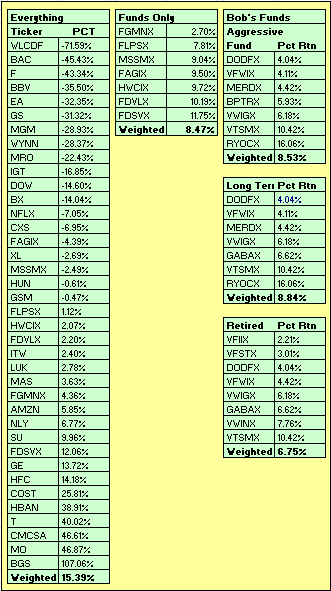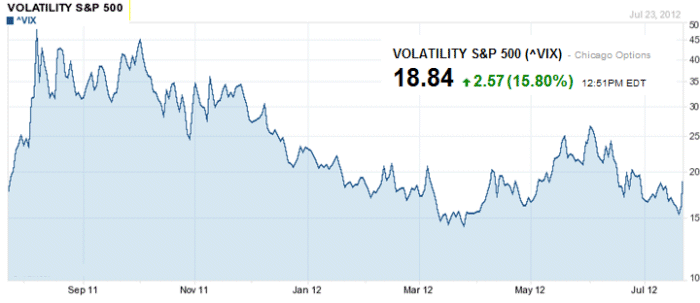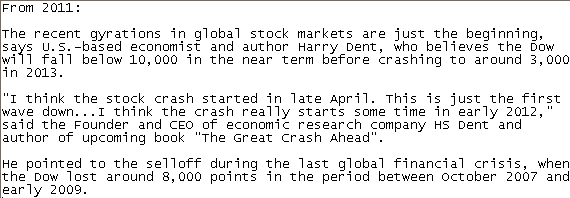Personal
Portfolio

|

Earnings have been coming in and may of them are not
that bad; some in fact have been spectacular. Anything homegrown
with little exposure to the European markets and overseas in general
seems to be the place to invest.
Dividend paying stocks are working out very well in this climate.

|
|
Electronic Arts Revisited for the
Fifth Month (More Groaning)

Well, well, well - I can actually see something positive.
When's the last time you've actually seen a PE for EA?

Speaking of PE's, it's been a long time since I've seen a PE for
Netflix as well.
I
decided the 25% drop was just too attractive to pass up and picked up a
small percentage at 62.13 a share, which I hope is a short
term
investment opportunity.
.
The
VIX - What is it Anyway?

The
VIX , otherwise known as the volatility index, or the fear and
trepidation index, is a measure of volatility in the S&P 500
options index.
Put simply, big spikes in the index usually means
big price moves in the up or downward direction and one can use that to
his advantage.

Take
Amazon, for example. This morning there was more
bad news
coming out of Euroland and the expectation of course is a tanking US
market.
This can easily knock $5.00 off Amazon's share price
in a heart beat. Buy 100 shares at or near the low for the
morning and it is probable that the stock can gain $5.00 back
in
a few days.

Of course, you can also do considerably better than that :) .
If the VIX continues to remain high, odds are that the trade will
execute in a short period of time.
Granted,
a $500 gain off 22K worth of stock isn't that much, but if you are
holding the shares in a tax privileged account like a ROTH, that means
the $500 you may have earmarked as a Roth Contribution can be spent
elsewhere, or it is the equivalent of doubling up on your monthly
investment if you added the additional $500 anyway.
A flat VIX generally means the market is treading water and that makes
it harder to generate a profit.
One can do quite well using volatility to his or her advantage,
although you do have to have the stomach and patience for it.
Trade Settlement Dates (or T+3) - Why these should be taken seriously.
The
short answer is if you don't play by the rules, you can end up trading
with settled funds only, which means missing out on trading
opportunities.
These are known as Reg T violations and most brokerage accounts allow only three of them.
The first two violations get you a politely worded email not to do that again.
The third violation gets you a trading restriction for the life of the account.
Settled funds are cash that has been sitting as cash for at least three business days + the trade date.
This is what you can do if you are starting out with settled funds:
A. Buy stock X and Sell stock X on Monday, and then Buy Stock Z on Monday.
However, you must hold Stock Z for T+3 (Monday + 3 Days).
You can sell the stock on Thursday without incurring any warnings.
B. Buy stock X on Monday, sell stock X on Thursday and buy stock Z on Thursday.
C. Sell stock X on Monday (assuming the stock has been held for at
least 3 days plus the trade date),
buy stock Z on Monday and then sell stock Z on Monday.
You must wait until Thursday (T+3) for the money to settle, until you can trade again.
To ensure I stay out of trouble, I prefer T+4.
It's simpler that way.
Is
'Buy and Hold Forever' Really Dead?
This is what
the financial media would have you believe and why do you
suppose that is......
Look on any financial news site and what do you see...
You see numerous ads from brokerage firms, all espousing
reasons why you should trade
with them.
You see all kinds of trading
advice from show hosts, guests and other experts - Trade of the Day, Trades for Tomorrow,
how to make you a better
Trader.
It's all about getting you to spend your money on trading, which is
how everyone else makes their money off of you in the form of
commissions.
'Buy and Hold Forever '
is not conducive to adding to the bottom line of other people's
businesses and therefore it must be actively discouraged.
The
financial media does a good job promoting that.
I think it boils down to what it is that you are wanting to do:
A. Invest for Retirement
B. Invest for Profit
C. A Combination of Both.
For most people, it is probably a combination of the two.
The
best of all worlds I think, is to have a core holding of 'Buy and Hold
Forever' stocks in a retirement account plus a chunk of change set
aside to take advantage of trading opportunities as they arise.
This is also a very good way to leverage your assets and trading power.
Trades
in retirement accounts and dividend distributions are free of tax. That
is a big advantage over trading in taxable accounts.
Of course
there is an element of risk involved. Losing trades are not
tax
deductible in a retirement account. Any losses incurred are
permanent.
In other words, it is a good idea to know what you are doing.
Here's two examples of 'Buy and Hold Forever' stocks:

I
bought BGS Foods for my and my wife's retirement accounts roughly six
months after the stock went public in 2008 for six and change, and have
held it ever since. Dividends were and are being reinvested
in
more shares of stock.
Trading this stocks on the highs and lows
would be foolish. The only reason I would sell BGS Foods would be if
and when the fundamentals change. Until then, this is a 'Buy
and
Hold Forever' stock.

I
bought Altria whilst bottom fishing in early 2008 and have continued to
hold the stock, reinvesting all dividends. I did have to sell
a
little last year because the position as a percentage of the entire
portfolio was growing too large.
The stock is generating around 4.6% in dividends reinvested in new shares of stock for me every
three
months......and it's all in retirement accounts.
Now why in the world would I want to give that kind of performance up
for short term trading opportunities?
Only a fool would do that.

|
THE PROPHET WATCH
What we have here is CNBC's prophet,
seer, revelator - and major PITA. Detailed Opinion Here
Financial Analyst - NOT
Soothsayer - NOT
Bearer of Practical Financial Advice - Occasional
Man's Worst Nightmare - Maybe......
Having to listen to annuity pitches
interspersed with vitamin infomercials could be worse.
|
Let's
keep track of just how well this PITA's
'predictions' pan out for the rest of the year.
| 2012 |
Predicted |
Jan |
Feb |
Mar |
Apr |
May |
Jun |
Jul |
Aug |
Sep |
Oct |
Nov |
Dec |
| Gold |
$2,000.00 |
1736.7 |
1716.28 |
1671.9 |
1664.2 |
1616.9 |
1604.2 |
1613.8 |
|
|
|
|
|
| Recession |
60%
Chance |
Nope! |
Nope! |
Nope! |
Nope! |
Nope! |
Nope! |
Nope! |
|
|
|
|
|
| TIPS
Current 5yr Yield |
Home
Run - Maybe |
0.95% |
0.90% |
-.126% |
.125% |
-1.03% |
-1.00% |
-1.22 |
|
|
|
|
|
July Comment: This individual is one of the many followers
of Harry Dent who is basically a perma-bear, who had a marginal claim
to fame for writing books about individual retirement accounts:

Around
here, every weekend there is a certain radio show that plays a spot
several times in which it is noted that 'Harry Dent is calling for DOW
3000 and what happens if he is right?
Have you talked to your
financial apartment about this? Do you have a game plan?
Probably not.....so that's why you have to hire us to guide
you
through the trepidation and fear. '
It gets nauseating. That's just one individual this PITA
apparently follows.

This is either a mockingbird or a female western kingbird.
I'm leaning towards mockingbird.
|
|
|



